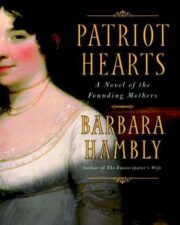But if they were field-hands, Sally reflected uneasily, somebody was short-feeding ’em and selling off the rations. One man spat after the carriage as it clattered by.
Looking back, Sally had to admit that painful as it had been, her sojourn at Eppington had been for the best. If she hadn’t been there when Mr. Jefferson’s letters had come, insisting that Polly be sent to join him in France—if Aunty Isabel hadn’t been with child and unable to make the voyage—she wouldn’t be sitting here now. She wouldn’t be about to see Jimmy again, her favorite brother. Lazy, handsome, prankish, troublemaking Jimmy: She almost laughed out loud at the thought of him. Her mother had sent her word that Mr. Jefferson was having him taught French cooking, which was supposed to be the best in the world, though Sally couldn’t imagine better cooking than what her Aunty Lita could produce in a single pot over the fire.
She wondered if he’d learned to speak French like the lofty M’sieu Petit. (Enough to cheat at cards and find every alehouse for five miles around, anyway!)
She wondered if he’d changed.
A stone bridge, and the deep glitter of water; a speckled flotilla of ducks. Then woods again, like the wooded mountaintop of Monticello, crisscrossed with paths and dotted with lawn and flowers. A park, like the great parks in London, Hyde Park and Grosvenor Square where Mr. and Mrs. Adams would go walking with Polly, during the ten days they’d stayed in that wonder-filled metropolis.
Mrs. Eppes, and Aunty Isabel, had given Sally strict instructions about staying at Polly’s side and staying in the house when Polly was out with the white folks—by the time it was known Sally would accompany her charge to France, Mrs. Eppes was as familiar as Aunty Isabel was with Sally’s boundless curiosity, her omnivorous craving to find out about anything she didn’t know. Neither the white aunt nor the black nurse had ever been to a city bigger than Williamsburg, but they’d guessed what temptations would flaunt themselves across Sally’s path.
“The girl’s never to be found when you want her,” the delicate, formidable Mrs. Adams had complained, on their second day beneath her roof. “A fine nursemaid for a child Polly’s age!”
But London—!
Even the birds were different in London: cocky little brown sparrows, instead of the silvery doves Sally knew in Virginia. The summer night-noise, too, was different, watchmen and carts and vendors all yelling, instead of the incessant clamor of night-crying insects. Her heart hurt for the songs of the mockingbirds, but in Grosvenor Square, walking in the twilight (when she should have been back at Mrs. Adams’s house!) she’d heard the indescribable sweet voice of the nightingale, that all the fairy-tales talked about.
All those crowded houses had their stables along separate alleyways that begged to be investigated. The Square and every street around it was alive with vendors who brought not only milk and eggs and vegetables from the markets but also hot pies, scarves, slippers, quills for making pens. The markets were jaw-dropping carnivals of activity, produce, servants, housewives, whores—Sally had never seen a whore, and had to quietly confirm with Mrs. Adams’s maid Esther that yes, those women with bright clothes and hair that startling color made their living by coupling with men.
Sally loved Virginia with the whole of her heart—loved its stillness, the sweetness of the woods, and the soft peaceful twilights. But the world was a marvel-filled place. Even Mrs. Adams had unbent, when Sally had asked, a little fearfully, if she might be permitted to read some of the books in Mr. Adams’s library: Coming back to books after four years without them was like sitting down at table starving. Like Mr. Jefferson, fat, grumpy Mr. Adams loved books, and like Mr. Jefferson both he and his beautiful wife were born schoolteachers.
There would be books in Mr. Jefferson’s house.
Had Mr. Jefferson changed?
Though her resentment at him had burned bitter in her for four years, she had never been able to eradicate from her heart the memory of his violin echoing in the darkness for his dying wife. The tireless months Mr. Jefferson had spent in Miss Patty’s room watching her fade from life returned to Sally’s mind, confusing the simplicity of her anger at all he had done. And not only to her: Even as a child of eight, Sally knew it took two to make a baby. It was impossible that Mr. Jefferson, a grown man who had read books and talked to doctors, wouldn’t know it, too.


"Patriot Hearts: A Novel of the Founding Mothers" отзывы
Отзывы читателей о книге "Patriot Hearts: A Novel of the Founding Mothers". Читайте комментарии и мнения людей о произведении.
Понравилась книга? Поделитесь впечатлениями - оставьте Ваш отзыв и расскажите о книге "Patriot Hearts: A Novel of the Founding Mothers" друзьям в соцсетях.